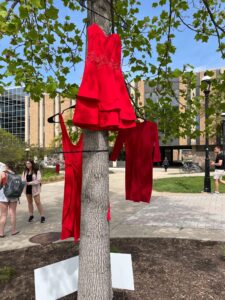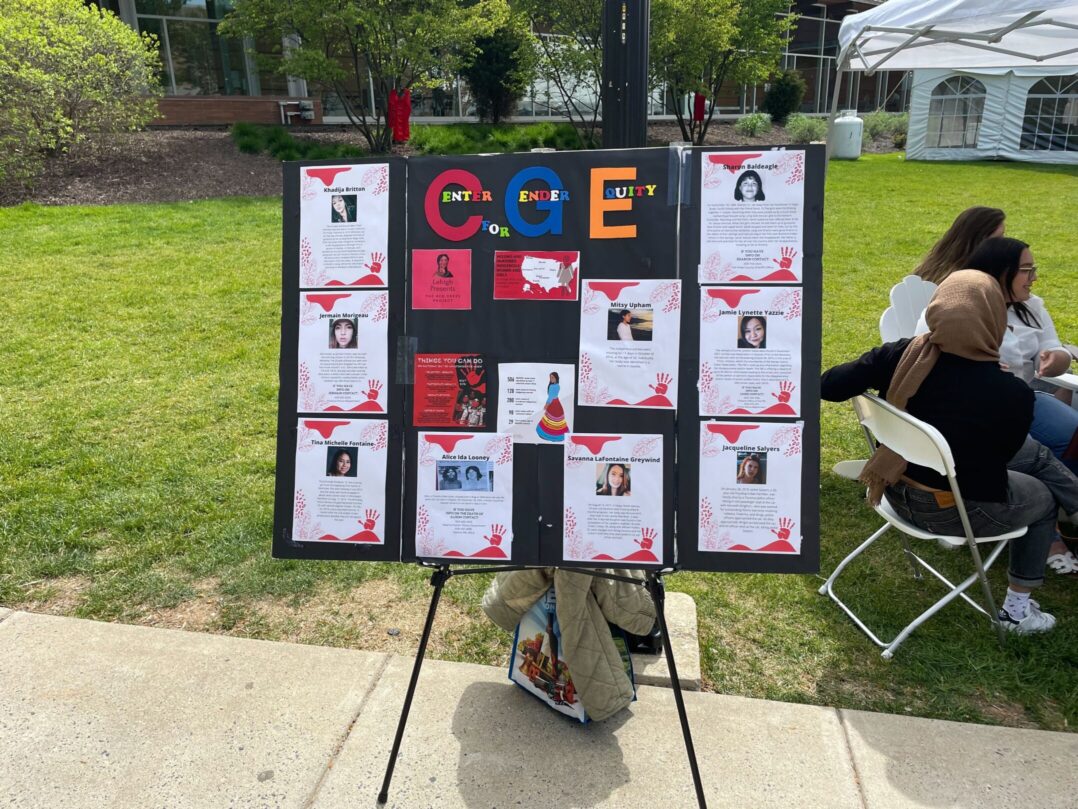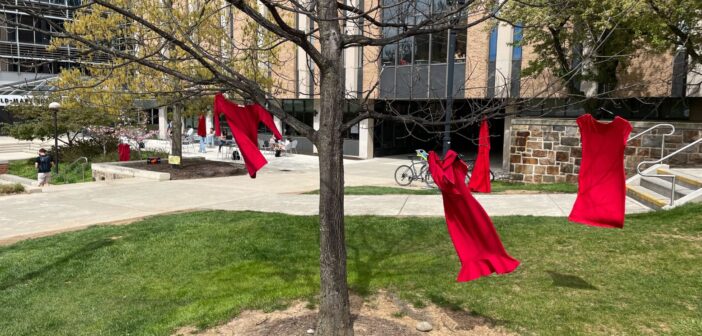Lehigh’s Center for Gender Equity and the Women, Gender and Sexuality Studies Department hosted an adaptation of the REDress Project on May 6.
The REDress Project is an art installation created by artist Jamie Black in 2010 bringing awareness to the epidemic of missing and murdered indigenous women and girls. According to Black’s website, the premise of the project is to display red dresses in public spaces to remind people of the violence these women are experiencing, as well as their presence.
The installation has since become a national movement. May 5 is now known as “Red Dress Day,” in which participants are encouraged to display or wear red dresses in support of indigenous women.
For Lehigh’s adaptation of the installation, red dresses donated by the Lehigh community were hung from trees on the STEPS lawn.
Jennifer Cocchiere, ‘24, is pursuing a minor in Women, Gender and Sexuality studies. She organized the event with a friend to complete her internship requirement for the minor.

Lehigh’s Center for Gender Equity and the Women, Gender and Sexuality Studies Department put on an adaptation of the REDress project. The project raises awareness for missing and murdered indigenous women and girls. (Nikki Pasterczyk/BW Staff)
“The dresses are a good symbol of these women,” Cocchiere said. “It’s kind of ominous having them sway in the wind and seeing them hang in the trees — you have to pass by and notice it.”
Cocchiere said red is symbolic of the indigenous community. She said indigenous women are murdered and go missing at disporportinately higher rates than any other racial or ethnic group.
Cocchiere said many indigenous women in the U.S. face issues with citizenship status, leading them to go unrecognized as citizens.
“When they do go missing, it goes unnoticed,” Cocchiere said. “So there’s a huge issue of women just falling through the cracks.”
She said this issue often goes unnoticed and it is important that it gets recognition, especially among the predominantly white Lehigh community.
Monica Najar, professor of history and director of the Women, Gender and Sexuality Studies program, said many people who walked by STEPS during the installation stopped by to ask about the dresses. She said that kind of conversation was the goal of the installation.
“The haunting vision of these dresses has made a lot of people stop,” Najar said.
Najar teaches a course called Gender and Society, in which students can create a project, teach a class, or design a video related to the course material.
Cocchiere and another student organized the REDress event as a part of the class.
“This was something that spoke to them,” Najar said. “They could have done any project, but they had done some reading about the ways in which indigenous people had interacted with the state which disempowered them for generations.”
Najar said students can get involved with helping indigenous women by getting in contact with their congressperson or by donating money to legal services working to aid these women..
Alpha Phi sorority hosts an annual Red Dress Gala, in benefit of the organization’s philanthropy, which is women’s heart health. Lehigh’s Alpha Phi chapter hosted its Red Dress Gala in March.

Lehigh’s Center for Gender Equity and the Women, Gender and Sexuality Studies Department put on an adaptation of the REDress project. The project raises awareness for missing and murdered indigenous women and girls. (Nikki Pasterczyk/BW Staff)
President of Lehigh Alpha Phi Cassandra Farrell, ‘23, said she immediately shared information about the REDress project at Lehigh with her chapter, and encouraged members to donate their dresses from the Red Dress Gala to the cause.
She said it is important that the sorority stands by other women, and members were eager to donate their dresses.
Farrell said this event touched upon Alpha Phi’s values of sisterhood, generosity, innovation and character.
“Generosity is seen by the women who donated their dresses for this event,” Farrell said. “And character is shown by those who take the time to listen and learn about the experiences of indigenous women, while encouraging others to do so at the same time.”






Comment policy
Comments posted to The Brown and White website are reviewed by a moderator before being approved. Incendiary speech or harassing language, including comments targeted at individuals, may be deemed unacceptable and not published. Spam and other soliciting will also be declined.
The Brown and White also reserves the right to not publish entirely anonymous comments.